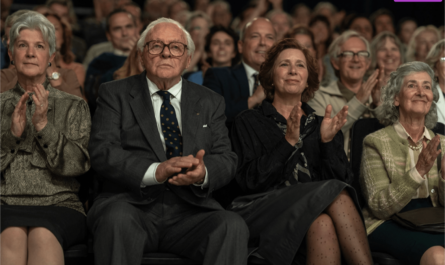Cabo Negro Review: Slow cinema isn’t everyone’s cup of tea, and distinguishing between a slow-burn narrative and a film with a paper-thin plot can be tricky. Abdellah Taïa’s Cabo Negro, a collaboration between France and Morocco, spends its initial half testing the audience’s patience, offering no plot exposition or backstory. This lack of immediate narrative direction might frustrate some viewers. However, as the story gradually unfolds and Taïa’s themes become clear, the film transforms into a poignant and heartbreaking exploration of individuals seeking their place in the world.
While the plot might be sparse, Taïa compensates with breathtaking visuals and impactful sequences. I experienced a rare shift from disliking the film for its seemingly aimless progression to being deeply moved by its eventual message. It’s unfortunate that the first 45 minutes feel so barren, as an expanded plot could have elevated Cabo Negro to excellence. Nevertheless, there’s still much to admire in the film as it stands.
Cabo Negro (2024)
Drama
In Cabo Negro, Soundouss and Jaâfar, two young people from Casablanca, find themselves at a luxurious villa rented by Jaâfar’s American lover, who never appears. With no way to contact him, they decide to make the most of their holiday, reflecting on their lives and relationships in the process.
Director
Abdellah Taïa
Cast
Oumaïma Barid, Youness Beyej, Julian Compan, Manal Fatah, Mohamed Amine Kihal
Runtime
76 Minutes
What Is ‘Cabo Negro’ About?
Jaafar (Youness Beyej) and Soundouss (Oumaima Barid), two friends in their late teens or early 20s, arrive at a pristine villa in Cabo Negro, Morocco, expecting to be hosted by Jonathan, a wealthy American who is also Jaafar’s seasonal lover. However, when Jonathan fails to show up and becomes unreachable, the two friends spend their days enjoying the beach and their luxurious surroundings. But as Jonathan continues to avoid contact and the villa owner grows hostile, their idyllic holiday is cut short. Running out of money, they resort to sex work to survive. What begins as a dream vacation turns into a harsh reminder of their realities and the inescapability of their past.
Cabo Negro’s First Half: A Test of Patience
The first 45 minutes of Cabo Negro are a severe test of patience, with little plot setup or backstory provided. Jaafar and Soundouss speak sparingly, and scenes of silence or minimal dialogue stretch to the point of almost feeling absurd. The lack of apparent themes or ideas during this time can be frustrating. However, once the narrative kicks in, the film reveals its heart. This shift begins when a heartbroken Soundouss visits a shop to print photos of her ex-girlfriend, still deeply in love with her. As Soundouss adores the photos, the shop attendant looks at her with a mix of endearment and sympathy, wishing her “Good luck” as she leaves, happy.
The Subtle Moments That Define Cabo Negro
Cabo Negro is built on these small, subtle moments, which accumulate to reveal the film’s true focus: community. Displaced and disenfranchised, Jaafar and Soundouss have no home and must work by any means necessary to maintain their temporary one. Despite their queer identities, they remain connected to their Muslim faith, even though it is intolerant of their sexuality. Jaafar, for instance, continues his daily prayers despite being gay. This conflict between faith and identity has clearly marked the two young people, leading to a disassociation as they turn to sex work. The film captures the darker aspects of their lives with a mundane detachment, emphasizing how much they have resigned themselves to a lifestyle forced upon them.
Cabo Negro’s Second Half: A Heartfelt Conclusion
The film’s most powerful scene, encapsulating its message, occurs when Soundouss prepares a large couscous and meat dish, bringing it outside to share with Jaafar, his new boyfriend Mounir, and other transient individuals. As they eat together, some using spoons, others with their hands, the silence speaks volumes. This moment of shared experience and community, captured beautifully by Taïa, offers a profound image that justifies the slow buildup of the film’s first half.
In any slow-burn film, the weight of the story often falls on the performers. Youness Beyej and Oumaima Barid’s understated performances may not seem groundbreaking at first, but as the narrative unfolds, so do their characters. Jaafar’s dark past, filled with trauma, is revealed through their conversations, hinting at the difficulties they face due to their sexuality. Yet, they are not defined solely by their hardships.
Barid brings a naive but infectious joy to her role, particularly in moments where she interacts with her girlfriend or prepares a meal for others. Beyej portrays Jaafar’s need for love with thoughtfulness, making the pair characters you can’t help but root for. Despite the tragic circumstances of their lives, they maintain a sense of hope that they will eventually find a place to call home.
Cabo Negro may not be a film for everyone, but those who can endure its slow pace and minimalist approach will discover a powerful story with heartfelt messages. Taïa’s storytelling is commendable for its restraint, avoiding melodrama or exploitation even in the film’s more uncomfortable and upsetting moments. Instead, he presents a slice of life that offers insight into the daily struggles some face to find a semblance of peace.



